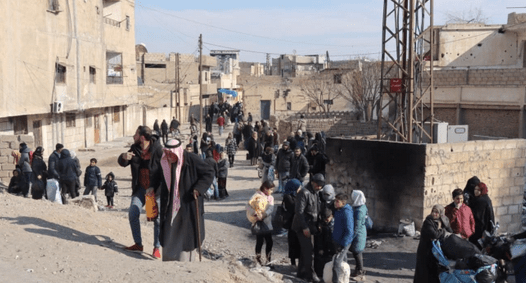
Afghanistan’s economic crisis deepens amid turmoil in Kabul
The horrific attack on a Kabul mosque on Wednesday was a grim reminder of the fragile security situation in Afghanistan. The bombing during evening prayers at the Siddiquiya Mosque in northern Kabul killed and injured scores of worshippers, according to a Taliban-appointed police spokesman quoted by the press. Among the dead was Mullah Amir Kabuli, a prominent cleric.
Also on Wednesday, the Taliban announced the killing of Mehdi Mujahid in western Herat province as he was trying to cross the border into Iran. He was a Taliban commander in the district of Balkhab in northern Sar-e Pol province and one of the few Hazaras in the Taliban movement. Apparently, Mujahid had turned against the Taliban over the past year and was attempting to flee to Iran.
While security has improved since the end of the war between the Taliban and the US, these two events demonstrate how serious security challenges remain.
One year on from the Taliban’s takeover of Afghanistan, conditions in the country have taken a turn for the worse in many respects. The status quo authority has reinstated restrictions on women’s education and employment and has failed to provide basic services to Afghanistan’s population of 40 million, most of whom are in need of humanitarian aid.
While these issues have gained some media coverage, there has been less attention given to the meltdown of Afghanistan’s economy following the American withdrawal and the Taliban’s seizure of power a year ago. For much of the two decades under US control, Afghanistan’s economy and government revenue were dependent on outside development aid, mostly from America. There were only the beginnings of homegrown, independent and sustainable economic activity, but those budding activities have ceased following the US withdrawal.
A recent meeting of regional and international donors and aid agencies hosted by the GCC discussed at length the difficulties of providing aid to Afghanistan, especially development aid. While there has been some progress in restoring humanitarian assistance, there has been no comparable progress in delivering development assistance, i.e., medium and long-term aid to provide basic services. Nor have there been any significant efforts to reignite private economic activity.
Participants at the GCC-hosted meeting stressed the need to couple delivering humanitarian aid to the Afghan people with providing them with the means to resume something close to normal economic activity, so that those who are capable can care for themselves or their families without constantly relying on outside aid.
However, there are four main impediments to a return to normal economic life: Security, the Taliban’s own actions, international sanctions, and the freezing of the Afghanistan central bank’s reserves. While it was acknowledged that the security situation has improved in some respects after the war ended last year and aid workers are able to travel to more areas of Afghanistan than before, formidable obstacles remain, including the safety and freedom of movement of female aid workers, especially Afghan women.
The Taliban’s actions since returning to power have made it difficult for any outside government to recognize them, let alone to consider providing them with aid or helping them run the economy. They have failed to form an inclusive administration and have imposed severe restrictions on women. The onus is on the status quo authority to keep its repeated promises to live up to international conventions regarding the rights of women and minorities, which would make it easier for the international community to deal with it and resume development aid, trade, investment and economic cooperation.
International sanctions have also made it difficult to revive economic cooperation, trade and investment. They were designed to target only Taliban leaders and senior operatives, and they worked to that effect before August 2021. However, once the Taliban became the status quo authority in the country, sanctions against them also affected dealings with the country as a whole. The UN Security Council issued a humanitarian exemption last December, but that does not include non-humanitarian aid or economic cooperation, which remain under sanctions.
There is a need to revisit the sanctions regime to fine tune it so that it does not pose an impediment to helping the Afghan people, while making sure that sanctioned Taliban leaders remain so until they comply with demands made by the international community and repeated entreaties by the Organization of Islamic Cooperation and Islamic scholars regarding the treatment of women and minorities.
Washington’s freezing of Afghanistan’s central bank assets has also had a negative effect on the country’s ability to resume economic activity. It is clear that the US is still concerned about the well-being of the Afghan people, even after its withdrawal. The wording of President Joe Biden’s executive order in February made it clear that the US had declared a national security and foreign policy emergency as a result of the “widespread humanitarian crisis in Afghanistan… and the potential for a deepening economic collapse.” And while the reasons behind the freeze are understood, there is a need for the US to have a discussion with its international partners to find ways to release those funds without them being made available to the Taliban.
Last week, a group of more than 70 international economists sent an open letter to Biden urging the prompt return of more than $7 billion of Afghanistan’s foreign exchange reserves to the central bank. The letter reflected a growing consensus among international aid groups, including the UN, regarding the need to release those funds.
The fact that Al-Qaeda leader Ayman Al-Zawahiri, who was killed in a US drone strike on July 31, was sheltering in Kabul within the Taliban’s immediate reach has made the release of the funds more complicated, but discussions about the matter continue.
The GCC-hosted meeting also stressed the need for a more engaged discussion between donors, aid agencies and other key international players. Such coordination could find ways to help the Afghan people while maintaining pressure on the Taliban to reverse course.
Source: Arab News





